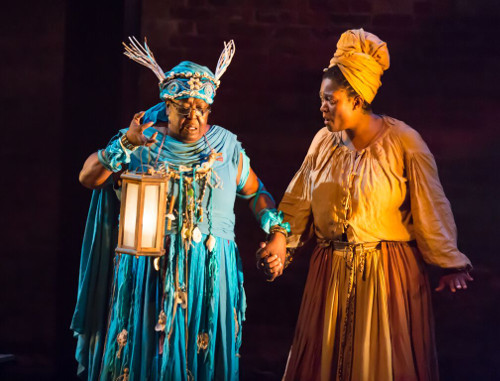
Obeah Opera is a powerful a capella story on stage at the Young Centre in Toronto
The theatre is no stranger to the Salem Witch Trials, a series of prosecutions that took place between 1692 and 1693 over accusations of witchcraft that led to the execution of several people. Obeah Opera, playing at the Young Centre for the Performing Arts as part of PANAMANIA, focuses the narrative on the perspectives of the Caribbean slave women who were among the first accused. It does so by blending theatre, dance, and various African-American musical styles into one “epic” a cappella theatrical experience.
The result was a theatre that leapt to its feet the instant the lights came up, and applauded so long that the company had to come out for a second bow.
Obeah Opera focuses the story of the Salem Witch Trials on Tituba (played with nuanced strength and compassion by Nicole Brooks), a Caribbean slave woman who practices obeah, and who was historically the first to be accused by Abigail Williams and Betty Parris.
After Tituba uses her healing abilities to draw a young girl back from the brink of death, a spark is ignited amongst the Puritan population of Salem that leads to the persecution of not only her, but of her fellow slave women.
Previously produced as a much shorter work, this Obeah Opera has been developed further and expanded to a full two hours. It’s hard to tell, because the music feels so seamless, shifting through various genres with deftness and seemingly effortless complexity. It’s soulful and full of endless surprises, so much so that I’m sure a single listen isn’t enough to fully appreciate all the influences at work here.
Importantly, while the musical hysteria of the Salem witch trials fills the theatre, the unquenchable spirit of its victims positively shakes it. By far the most arresting numbers are those of the slave women practicing obeah together. Their voices are strong and versatile, seemingly bursting with a fervency that’s impossible to turn away from. When they dance, it’s a full-bodied, foot-stomping array of writhing, purposeful bodies that’s all pure, raw emotion.
The entire show is sung a cappella, and nothing about that choice feels incidental. It’s the kind of show that seems to be reaching back and looking forward at the same time, its form reflecting its aim. To examine critically the importance of voice, of community, of speaking the histories that have been so denigrated over time by those in control of the narrative of history.
It’s completely enthralling to watch this talented group of women, who are all so generously vulnerable, draw up this oft-ignored story by painting every moment, every scene with nothing but their own voices. There’s something unaccountably powerful in that: in watching these women give their voices to this little-known historical woman, and to watch Brooks’ Tituba grow into her own voice as a result.
But Obeah Opera is not just a show of incredible vocals (though it is that). It’s an intelligent, complex and utterly compelling exploration of endurance, storytelling and strength. The strength that comes from community, from identity, from history and faith; and the unfathomably powerful and intensely vital power of claiming a voice.
Details:
- Obeah Opera is currently playing at the Young Centre for the Performing Arts as part of PANAMANIA.
- The show runs until August 8th.
- Currently, all remaining shows are sold out.
Photo by Racheal McCaig.
